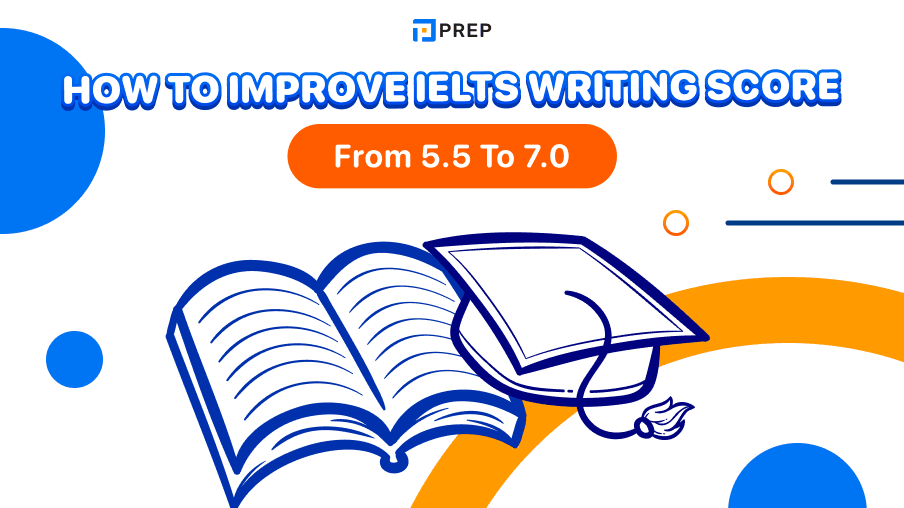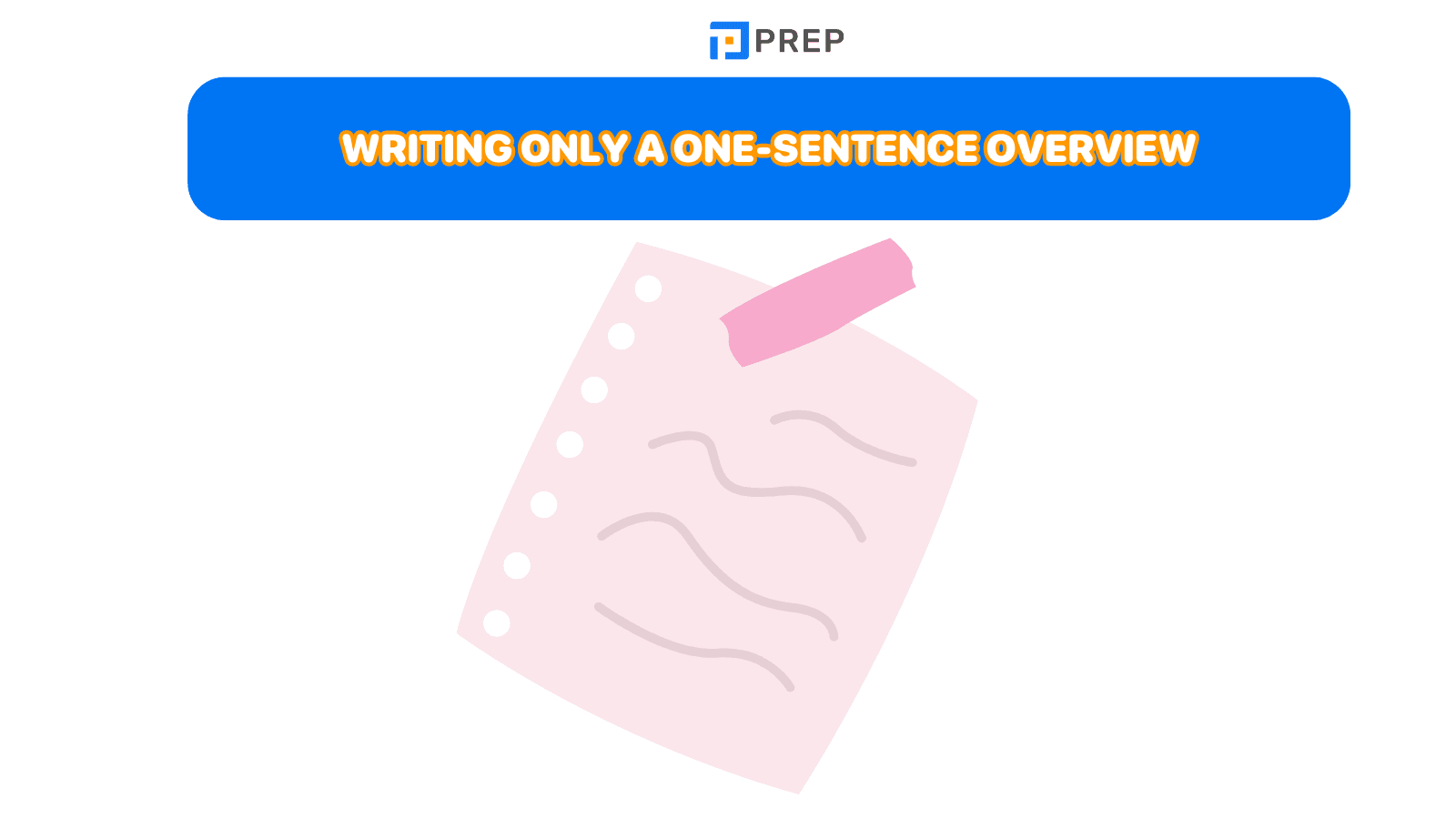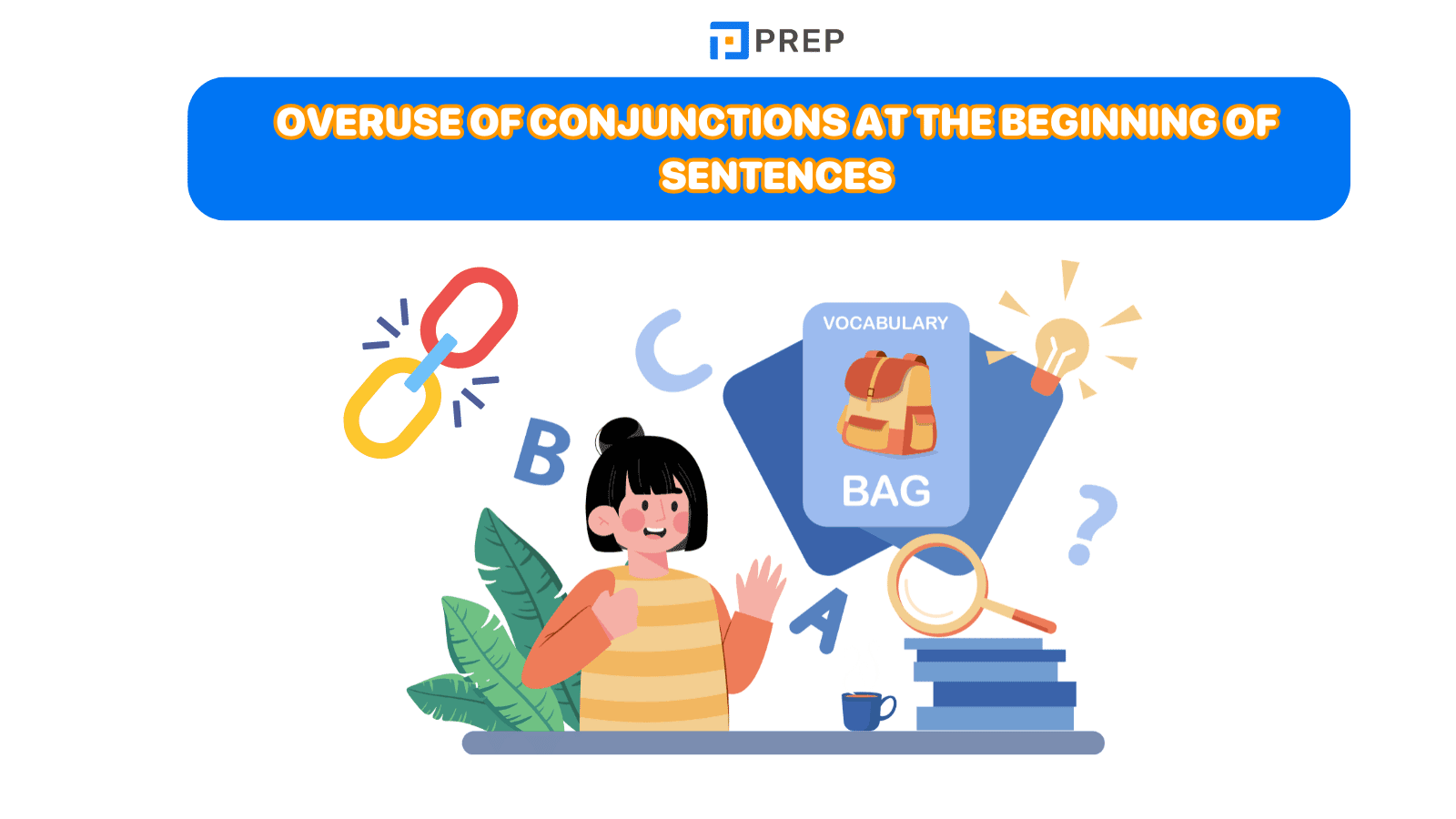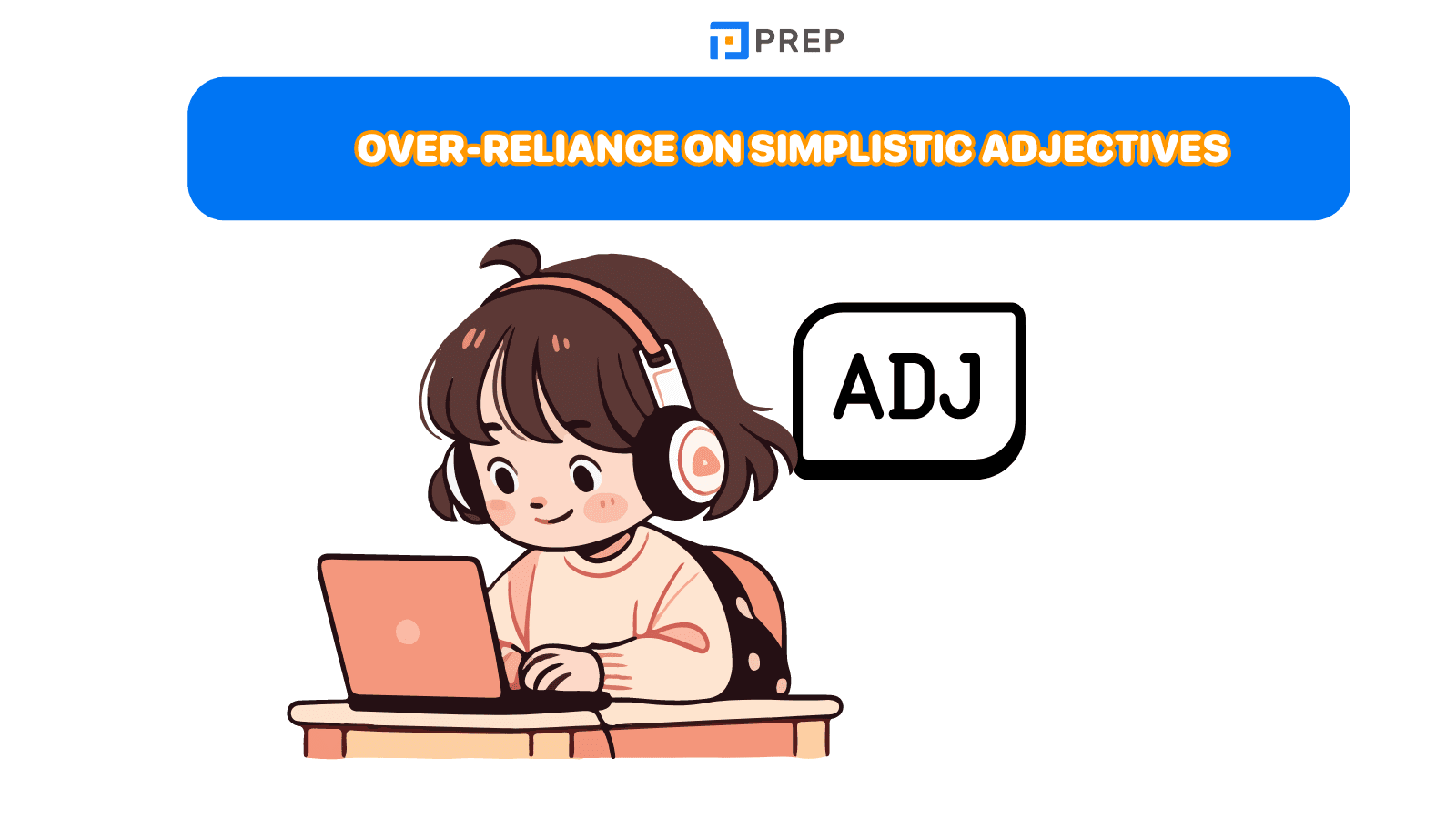How to improve IELTS Writing score from 5.5 to 7.0: Insights and Strategies
This article shares the journey of a Preppies student who successfully achieved a band score of 7.0 in IELTS Writing after multiple attempts at the 5.5 band. Let’s explore the strategies undertaken by this student about how to improve IELTS Writing score from 5.5 to 7.0!

I. Mistakes that kept the student at the 5.5 band
1. Writing only a one-sentence overview
Initially, I believed that an overview should consist of just one sentence, regardless of its length or complexity. However, through direct interaction with teachers and receiving feedback, I realized that IELTS Writing has been updated to discourage the use of one-sentence paragraphs.

2. Overuse of conjunctions at the beginning of sentences
I habitually used a specific structure in my writing, starting sentences with "S + V. However, S + V." instead of "S + V, however, S + V." However, after extensive reading and guidance from teachers, I discovered that using conjunctions at the beginning of sentences is not encouraged in the IELTS Writing test.

3. Excessive use of phrases such as "besides," "too," "very," and "to sum up"
Upon receiving feedback and engaging in discussions with teachers, I realized that the overuse of these phrases created an informal tone in my writing, which is not suitable for the formal nature of the IELTS Writing test.

4. Over-reliance on simplistic adjectives
While using simple adjectives like "good," "bad," "nice," "big," and "small" may not be grammatically incorrect, they are not considered sophisticated and are not typically associated with higher band scores.

5. Neglecting the importance of outlining
I was reluctant to write outlines, so my essay structure lacked coherence. 'During the exam, we only have 60 minutes for 2 essays. If we spend time on outlining, how can we finish writing in time?' Oh, the foolish past me always underestimated the importance of outlines. There were times when I didn't have an outline, and as a result, I failed to address all parts of the question and lacked focus.
I had a funny and regretful situation when I was still at band 5.0. I wrote something like this: “This is firstly because people's living standards which have been greatly improved in recent years provoke they have to broaden their horizons. For example, that there are ample promotional opportunities can climb the career ladder so travel abroad helping them learn useful skills, experience different cultures and reduce stress.”
Now, reading it again, I don't understand why there is such a deep connection between the sentences. After that incident, I was determined to practice writing outlines so that I could have a structure to develop my ideas. Fortunately, up until now, I no longer go off-topic and consistently maintain a band 7 in Task Response or Coherence and Cohesion. I will write in more detail about my outlining practice in Part 2 for those who want to refer to it.
6. Misusing sample essays
While learning from sample essays is a valuable approach, I had been applying them incorrectly, resulting in a stagnant band score. I relied heavily on dictionaries for every new word, studied vocabulary and grammar separately, and memorized sentences, waiting for an opportunity to insert them into my essays.
II. How to improve IELTS Writing score from 5.5 to 7.0 after 2 months?
Actually, there is no magic technique, except for practicing and having someone to assess your writing. Getting feedback, clear explanations of why certain mistakes are considered wrong, has helped me understand many things and adjust the amount and type of knowledge I acquire while studying. Now, I will present the solutions I applied to eliminate the aforementioned mistakes.
1. Technique 1: Getting Speaking and Writing assessments is "mandatory"
Especially for Writing (and Speaking), getting assessments is crucial. You can't just learn templates and take the test without receiving any feedback. It's evident that without assessments and guidance from teachers, I wouldn't have realized my mistakes mentioned above.
I chose to get assessments at PREP because I'm currently taking their Writing course as part of a combo. It's worth it because I can discuss my assessments with the teachers, and clarify any confusion, and that's how I discovered the points mentioned above. I will provide an example of an assessed piece below for everyone to see. After receiving the assessed piece, I will copy the corrected version into my notebook and compare it with my original version, discovering the improvements in the new version compared to the old one.
After the comparison, I opened the teacher's corrected version, and reread the suggested corrections, the comments on the criteria, and the action plan at the end (in PREP, they provide an action plan based on each writing piece). If I notice anything missing in the teacher's feedback, I search for it on YouTube, TikTok, or Google and learn from there. Oh, back in 2018, when I attended an offline class with Teacher Bach, he had a book on collocations.
I take that book out and review it. Usually, I make notes, highlighting the words or phrases I need to learn in red while using green for regular text or sentences. Any words or phrases from Teacher Bach's book that I encounter in the reading section of the Cambridge book or in the sample essays he wrote, I highlight them again as a reminder to memorize them.
2. Technique 2: Correcting the wrong way of studying sample essays
Correcting the wrong way of studying sample essays. I mentioned two personal mistakes above, and here they are again with the reasons why they should be avoided:
- Mistake 1: Stopping and looking up every new word in the dictionary. Reason: It disrupts the flow of reading comprehension, making it difficult to grasp the overall ideas and the author's approach. -> Solution: Skip unfamiliar words if they don't affect the reading comprehension of the sample essay.
- Mistake 2: Diving into learning individual vocabulary and grammar. Reason: It's easy to overlook the overall structure, logical connections, and coherence of the entire essay. -> Solution: While reading, pay attention to the highlighted vocabulary and grammar in the essay but don't rush to read the glossary. Focus on understanding and analyzing first.
Steps I follow when reading the glossary:
- Step 1: Read the word/phrase and its meaning.
- Step 2: Read the whole sentence containing that word/phrase in the Writing Sample to understand its context.
- Step 3: If possible, consider whether there are other words/phrases that express the same idea. Is the glossary word/phrase better to learn?
- Step 4: Take note of the sentence containing the word/phrase in a notebook, highlight the word/phrase for future application in different contexts and essays. You can create flashcards on Quizlet or Memrise as well.
3. Technique 3: Practice writing outlines and always remember to write an outline before the main essay
I usually brainstorm before writing an outline. My brainstorming process includes identifying the topic of the essay and writing it in the middle, then listing related topics around it, such as education, culture, jobs and work, laws, transportation, etc. Then, I start connecting the main topic (the essay prompt) with the related topics and see if any ideas emerge.
Lastly, I consider whether the points I've drafted are advantages or disadvantages and mark them with + or - accordingly. If I find it difficult to understand, I can provide an example with the following essay prompt: "Some people think that it would be better for large companies and industries to move to regional areas outside large urban centers. Do you think the advantages outweigh the disadvantages?" Please scroll down to see the details.
After brainstorming ideas, I spend around 30 seconds browsing through them and organizing them based on which ones should be written first and which ones should come after. The structure of each body paragraph is as follows: Topic sentence → State the point → Explain the point → Provide an example → Conclude. If there are repetitive words, I use referencing instead, and I immediately note down any vocabulary related to the topic to avoid forgetting it while writing.
III. Conclusion
Now, do you know how to improve IELTS Writing score from 5.5 to 7.0? These are the techniques that our students used to improve from band 5.5 to 7.0 at PREP. PREP hopes you find them helpful in your journey to improve your IELTS Writing score. Remember, consistent practice, receiving assessments, and actively learning from your mistakes are key to making progress. Good luck!

Hi I'm Chloe, and I am currently serving as an Product Content Administrator at Prep Education. With over five years of experience in independent online IELTS study and exam preparation, I am confident in my ability to support learners in achieving their highest possible scores.
Comment
Premium content
View allPersonalized roadmap
Most read












